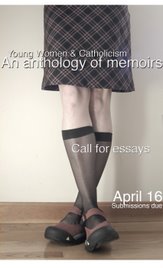 About five years ago, I wrote an entry in my journal which I entitled “Being a Catholic Woman.” I was a college sophomore, a double-major in English and Religious Studies, and an aspirant in a Roman Catholic women’s religious congregation. And I was searching – searching for a place to belong within a tradition that often defined me as the eternal compliment of men. At the time I wrote, “It seems that being a Catholic woman today is to work and be unappreciated, to speak and be silenced, to love and be rejected. It is to be caught between stagnant tradition and an enriched personal experience of faith, while attempting to build the Kingdom of God through a unique vocation and a myriad of ministries. Being a Catholic woman is a constant challenge to bring the Gospel not only to all of God’s people, but also to a hierarchical and patriarchal institution.”
About five years ago, I wrote an entry in my journal which I entitled “Being a Catholic Woman.” I was a college sophomore, a double-major in English and Religious Studies, and an aspirant in a Roman Catholic women’s religious congregation. And I was searching – searching for a place to belong within a tradition that often defined me as the eternal compliment of men. At the time I wrote, “It seems that being a Catholic woman today is to work and be unappreciated, to speak and be silenced, to love and be rejected. It is to be caught between stagnant tradition and an enriched personal experience of faith, while attempting to build the Kingdom of God through a unique vocation and a myriad of ministries. Being a Catholic woman is a constant challenge to bring the Gospel not only to all of God’s people, but also to a hierarchical and patriarchal institution.”I think there is still some truth in those words. “Being a Catholic woman,” for me, has indeed entailed living between the extremes of speech and silence, of love and rejection. What is different for me now, I think, is that I have come to accept the space between these tensions as my home.
When I was a little younger, in fact, when I wrote that initial reflection on Catholic womanhood, I still believed (desperately hoped?) that Catholicism would open its arms to me – its feminist daughter. I thought that I might still find a home within its familiar walls, that my questions and concerns about women, ethics, God would be welcomed. But they weren’t. Instead exclusive language continues, motherhood (physical or spiritual) is claimed as the essential vocation of all women, and theologians who dare to speak-out in favor of women’s reproductive rights are threatened with ecclesial censure. It has been hard for me to continue identifying myself as a Catholic woman. Of course, most would say that I should accept the Church as it is or leave. And perhaps they are right, perhaps I should leave. But who would I be without being Catholic? Being Catholic is not some sort of temporary club membership. It is a way of life. The teachings, controversies, horrors, and graces of the Catholic Church are the lenses through which I view the world. They are a part of me. Sometimes they obscure my vision, sometimes they sharpen my sight, but in all moments they enable me to recognize that being a Catholic woman is much more complicated than what at first might meet the eye.
Currently a doctoral student at Harvard Divinity School, Pearl Maria Barros earned her Master of Theological Studies degree from Harvard Divinity School and her Bachelor's of English and Religious Studies from Santa Clara University. When not reading, writing, and researching, she enjoys visiting with friends and family, traveling, and drinking coffee.



1 comment:
Dear Pearl;
I struggle with everything you have written about -- the tension of being a woman and a Catholic in an institution that too often emphasizes traditionalism rather than the richness of tradition founded in love and acceptance. I would very much like to contact you regarding an article I am writing about being a Catholic woman for the Harvard Divinity School Magazine. If you would be amenable, could you email me at barbbodengraven@comcast.net? Thank you so much.
barb bodengraven
MTS Weston Jesuit School of Theology 2005
Post a Comment